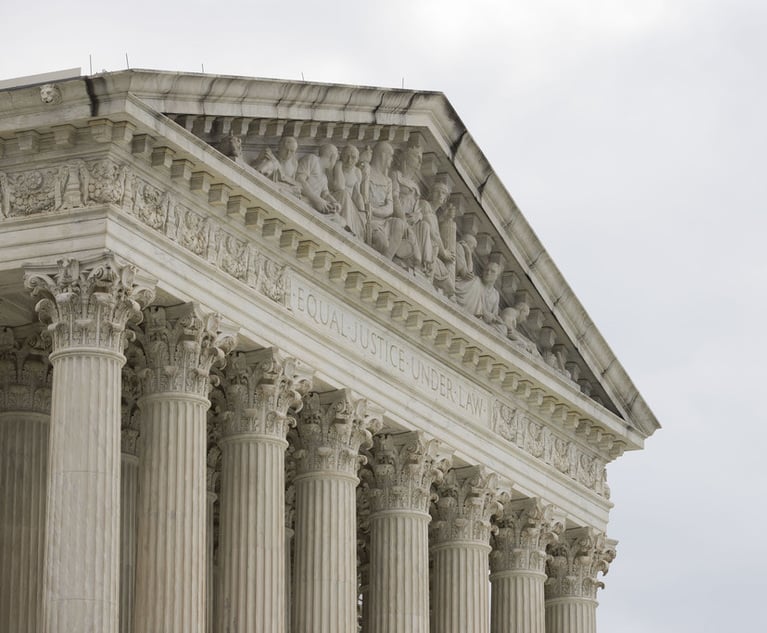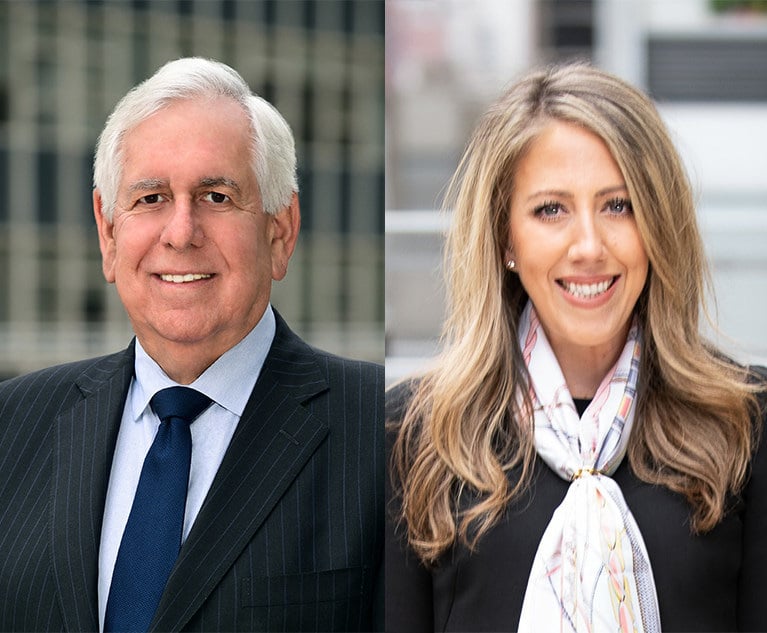Ballot Measure Authorizing State Constitutional Convention Fails
New Yorkers on Tuesday overwhelmingly voted against a proposal to hold a convention to make changes to the state's constitution. Updated results.
November 07, 2017 at 10:58 PM
13 minute read

New Yorkers on Tuesday overwhelmingly rejected a proposal to hold a convention to make changes to the state's constitution.
New Yorkers were presented with the referendum question “Shall there be a convention to revise the constitution and amend the same,” which is presented to the electorate once every 20 years. The last time voters approved having a constitutional convention was in 1967, but the ballot measures have been rejected on each occasion since then.
Nearly 78 percent, or 2.71 million voters, voted no on the ballot measure, according to data complied with the state's Board of Elections. Nearly 16 percent, or almost 548,000 voters, voted in favor of holding a convention, with 15,133 of 15,502 election districts reporting as of Wednesday morning.
Had the referendum been approved, New Yorkers would have elected delegates in 2018 to the convention, which would have met the following year. At the convention, delegates would have gathered to propose amendments to the state constitution for voter ratification. Then in November 2019, voters would get the opportunity to vote on each proposed amendment.
In a statement Tuesday night, New Yorkers Against Corruption, a campaign composed of labor unions, business organizations, progressive and conservative groups, lauded the vote.
“Our coalition galvanized voters across a broad ideological spectrum to rise up and oppose a corrupt process that would enrich Albany's political class while leaving the rest of us behind. Voters ultimately agreed that the con-con was just a con—a costly process full of risks and unknowns. Today was a win for our coalition but, more importantly, a win for all New Yorkers,” the emailed statement from the group said.
Adriene Holder, the attorney-in-charge of the civil practice of the Legal Aid Society, which had opposed the proposal, said in an email that the organization was “relieved” that New Yorkers voted down holding a convention.
“We are relieved for our clients and other low-income New Yorkers that the vital protections they rely upon will not be jeopardized by a constitutional convention,” Holder said. “While we share a desire for robust reform, a constitutional convention has always been a wrongheaded and ill-advised way to achieve those goals.”
Bill Samuels, a longtime Democratic political activist and founder of NY People's Convention, said the defeat of the constitutional convention is a “triumph for all of the enemies of reform in Albany: Andrew Cuomo, the political bosses in the State Legislature, and the lobbyists and special interests who thrive in New York's pay-for-play culture of corruption.”
“The constitutional convention movement was always about fundamentally reforming our broken system and transforming the state's government from an embarrassment into a proud model for the rest of the nation,” Samuels added.
A review of campaign contributions found that New Yorkers Against Corruption raised $3.16 million since July, disclosures with the state's Board of Elections reviewed by the New York Law Journal show. The organization reported $1.93 million in expenses, which include television ads and campaign literature.
Meanwhile, a campaign apparatus in favor of holding a convention only raised a fraction of what the opposition got in contributions. The Committee for a Constitutional Convention received $110,300 in contributions and reported $88,700 in expenses, according to disclosures. A separate organization in favor of holding a convention, NY People's Convention, raised $436,700 in contributions and spent $406,000 since July.
The prospect of holding a constitutional convention made for interesting bedfellows in New York, where opposing interests found commonality against the proposal. The state's widely influential labor unions banded together with environmentalists, good government groups, liberals and conservatives to form a campaign against holding a constitutional convention.
Convention opponents argued that opening up the state constitution for revisions and change could have been influenced by outside “dark money” and by similar donors that aided in the election of President Donald Trump. Opponents also argued that several provisions already existing in the state constitution, such as collective bargaining, could have been threatened, if not entirely undone.
On Monday, Gov. Andrew Cuomo—whose late father, Gov. Mario Cuomo, had been a strong proponent for holding a constitutional convention—also came out against holding one, arguing that the delegate selection process “does not offer enough protections to prevent the status quo and special interests from governing.”
The state's Supreme Court justices also opposed a constitutional convention, claiming that not only was it “unnecessary,” but it would also be “overly costly, and could result in the reversion, elimination or diminution of many current constitutional rights and safeguards.” The New York State Magistrates Association, which represents the town and village justices throughout the state, also voted to oppose the convention, arguing that delegates “could impose a fantastically expensive district court system at far greater annual cost to the taxpayers than our justice courts are now, without the 24-hour availability for which we are renowned.”
Meanwhile, the State Bar Association endorsed holding a constitutional convention to fix a “confusing and inefficient” court system. Proponents had their own campaign apparatus, the Committee for a Constitutional Convention. The campaign was managed by Evan Davis, a senior counsel at Cleary Gottlieb Steen & Hamilton and the former counsel to Gov. Mario Cuomo.
A Siena College poll released last Wednesday had indicated likely voters opposed a convention 57 percent to 25 percent.

New Yorkers on Tuesday overwhelmingly rejected a proposal to hold a convention to make changes to the state's constitution.
New Yorkers were presented with the referendum question “Shall there be a convention to revise the constitution and amend the same,” which is presented to the electorate once every 20 years. The last time voters approved having a constitutional convention was in 1967, but the ballot measures have been rejected on each occasion since then.
Nearly 78 percent, or 2.71 million voters, voted no on the ballot measure, according to data complied with the state's Board of Elections. Nearly 16 percent, or almost 548,000 voters, voted in favor of holding a convention, with 15,133 of 15,502 election districts reporting as of Wednesday morning.
Had the referendum been approved, New Yorkers would have elected delegates in 2018 to the convention, which would have met the following year. At the convention, delegates would have gathered to propose amendments to the state constitution for voter ratification. Then in November 2019, voters would get the opportunity to vote on each proposed amendment.
In a statement Tuesday night, New Yorkers Against Corruption, a campaign composed of labor unions, business organizations, progressive and conservative groups, lauded the vote.
“Our coalition galvanized voters across a broad ideological spectrum to rise up and oppose a corrupt process that would enrich Albany's political class while leaving the rest of us behind. Voters ultimately agreed that the con-con was just a con—a costly process full of risks and unknowns. Today was a win for our coalition but, more importantly, a win for all New Yorkers,” the emailed statement from the group said.
Adriene Holder, the attorney-in-charge of the civil practice of the Legal Aid Society, which had opposed the proposal, said in an email that the organization was “relieved” that New Yorkers voted down holding a convention.
“We are relieved for our clients and other low-income New Yorkers that the vital protections they rely upon will not be jeopardized by a constitutional convention,” Holder said. “While we share a desire for robust reform, a constitutional convention has always been a wrongheaded and ill-advised way to achieve those goals.”
Bill Samuels, a longtime Democratic political activist and founder of NY People's Convention, said the defeat of the constitutional convention is a “triumph for all of the enemies of reform in Albany: Andrew Cuomo, the political bosses in the State Legislature, and the lobbyists and special interests who thrive in
“The constitutional convention movement was always about fundamentally reforming our broken system and transforming the state's government from an embarrassment into a proud model for the rest of the nation,” Samuels added.
A review of campaign contributions found that New Yorkers Against Corruption raised $3.16 million since July, disclosures with the state's Board of Elections reviewed by the
Meanwhile, a campaign apparatus in favor of holding a convention only raised a fraction of what the opposition got in contributions. The Committee for a Constitutional Convention received $110,300 in contributions and reported $88,700 in expenses, according to disclosures. A separate organization in favor of holding a convention, NY People's Convention, raised $436,700 in contributions and spent $406,000 since July.
The prospect of holding a constitutional convention made for interesting bedfellows in
Convention opponents argued that opening up the state constitution for revisions and change could have been influenced by outside “dark money” and by similar donors that aided in the election of President Donald Trump. Opponents also argued that several provisions already existing in the state constitution, such as collective bargaining, could have been threatened, if not entirely undone.
On Monday, Gov. Andrew Cuomo—whose late father, Gov. Mario Cuomo, had been a strong proponent for holding a constitutional convention—also came out against holding one, arguing that the delegate selection process “does not offer enough protections to prevent the status quo and special interests from governing.”
The state's Supreme Court justices also opposed a constitutional convention, claiming that not only was it “unnecessary,” but it would also be “overly costly, and could result in the reversion, elimination or diminution of many current constitutional rights and safeguards.” The
Meanwhile, the State Bar Association endorsed holding a constitutional convention to fix a “confusing and inefficient” court system. Proponents had their own campaign apparatus, the Committee for a Constitutional Convention. The campaign was managed by Evan Davis, a senior counsel at
A Siena College poll released last Wednesday had indicated likely voters opposed a convention 57 percent to 25 percent.
This content has been archived. It is available through our partners, LexisNexis® and Bloomberg Law.
To view this content, please continue to their sites.
Not a Lexis Subscriber?
Subscribe Now
Not a Bloomberg Law Subscriber?
Subscribe Now
NOT FOR REPRINT
© 2024 ALM Global, LLC, All Rights Reserved. Request academic re-use from www.copyright.com. All other uses, submit a request to [email protected]. For more information visit Asset & Logo Licensing.
You Might Like
View All
For Safer Traffic Stops, Replace Paper Documents With ‘Contactless’ Tech
4 minute read
Impact of New NYS Workers’ Compensation Work-Related Stress Relief on Discrimination Claims

Justices Will Weigh Constitutionality of Law Allowing Terror Victims to Sue PLO

Are New York City Housing Providers Ready for the Fair Chance for Housing Act?
10 minute readTrending Stories
- 1Decision of the Day: Judge Reduces $287M Jury Verdict Against Harley-Davidson in Wrongful Death Suit
- 2Kirkland to Covington: 2024's International Chart Toppers and Award Winners
- 3Decision of the Day: Judge Denies Summary Judgment Motions in Suit by Runner Injured in Brooklyn Bridge Park
- 4KISS, Profit Motive and Foreign Currency Contracts
- 512 Days of … Web Analytics
Who Got The Work
Michael G. Bongiorno, Andrew Scott Dulberg and Elizabeth E. Driscoll from Wilmer Cutler Pickering Hale and Dorr have stepped in to represent Symbotic Inc., an A.I.-enabled technology platform that focuses on increasing supply chain efficiency, and other defendants in a pending shareholder derivative lawsuit. The case, filed Oct. 2 in Massachusetts District Court by the Brown Law Firm on behalf of Stephen Austen, accuses certain officers and directors of misleading investors in regard to Symbotic's potential for margin growth by failing to disclose that the company was not equipped to timely deploy its systems or manage expenses through project delays. The case, assigned to U.S. District Judge Nathaniel M. Gorton, is 1:24-cv-12522, Austen v. Cohen et al.
Who Got The Work
Edmund Polubinski and Marie Killmond of Davis Polk & Wardwell have entered appearances for data platform software development company MongoDB and other defendants in a pending shareholder derivative lawsuit. The action, filed Oct. 7 in New York Southern District Court by the Brown Law Firm, accuses the company's directors and/or officers of falsely expressing confidence in the company’s restructuring of its sales incentive plan and downplaying the severity of decreases in its upfront commitments. The case is 1:24-cv-07594, Roy v. Ittycheria et al.
Who Got The Work
Amy O. Bruchs and Kurt F. Ellison of Michael Best & Friedrich have entered appearances for Epic Systems Corp. in a pending employment discrimination lawsuit. The suit was filed Sept. 7 in Wisconsin Western District Court by Levine Eisberner LLC and Siri & Glimstad on behalf of a project manager who claims that he was wrongfully terminated after applying for a religious exemption to the defendant's COVID-19 vaccine mandate. The case, assigned to U.S. Magistrate Judge Anita Marie Boor, is 3:24-cv-00630, Secker, Nathan v. Epic Systems Corporation.
Who Got The Work
David X. Sullivan, Thomas J. Finn and Gregory A. Hall from McCarter & English have entered appearances for Sunrun Installation Services in a pending civil rights lawsuit. The complaint was filed Sept. 4 in Connecticut District Court by attorney Robert M. Berke on behalf of former employee George Edward Steins, who was arrested and charged with employing an unregistered home improvement salesperson. The complaint alleges that had Sunrun informed the Connecticut Department of Consumer Protection that the plaintiff's employment had ended in 2017 and that he no longer held Sunrun's home improvement contractor license, he would not have been hit with charges, which were dismissed in May 2024. The case, assigned to U.S. District Judge Jeffrey A. Meyer, is 3:24-cv-01423, Steins v. Sunrun, Inc. et al.
Who Got The Work
Greenberg Traurig shareholder Joshua L. Raskin has entered an appearance for boohoo.com UK Ltd. in a pending patent infringement lawsuit. The suit, filed Sept. 3 in Texas Eastern District Court by Rozier Hardt McDonough on behalf of Alto Dynamics, asserts five patents related to an online shopping platform. The case, assigned to U.S. District Judge Rodney Gilstrap, is 2:24-cv-00719, Alto Dynamics, LLC v. boohoo.com UK Limited.
Featured Firms
Law Offices of Gary Martin Hays & Associates, P.C.
(470) 294-1674
Law Offices of Mark E. Salomone
(857) 444-6468
Smith & Hassler
(713) 739-1250






